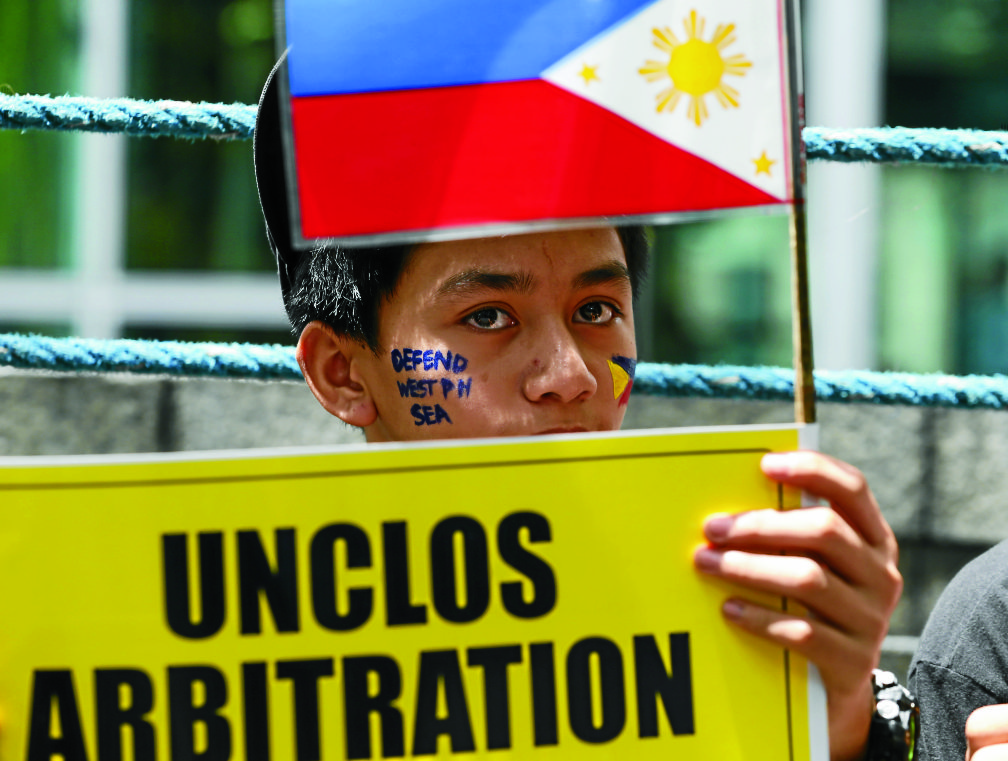Case lights up oldest tribunal in the world

ANTI-CHINA A protester stands outside the Chinese Consulate in Manila during a rally against China’s occupation and island-building in the Spratly island group in the South China Sea in this file photo. AP
THE HAGUE—The little-known Permanent Court of Arbitration (PCA) on Tuesday rules on a bitter dispute over the South China Sea that could have huge international ramifications amid growing tensions in the key waterway.
The Philippines brought the case against China in 2013, asking the court to find that Beijing’s claims to much of the territory in the sea are invalid and violate the United Nations Convention on the Law of the Sea (Unclos).
Here are five facts about the tribunal based in The Hague:
What is the PCA?
The PCA is the world’s oldest intergovernmental organization dedicated to resolving international disputes through arbitration “and other peaceful means.”
It came to life in 1899 during the first Hague Peace Conference convened by Czar Nicholas II of Russia. It refers to contracts, special agreements and various treaties such as those set up by the UN Commission on International Trade Law and the Unclos to rule in disputes.
It also has a permanent overseas presence in Mauritius and can conduct hearings all over the world.
The PCA’s arbitral tribunals have rendered more than 70 decisions in past cases and it currently considers 116 cases.
Recently concluded cases include rulings on a bitter border dispute between Eritrea and Ethiopia and handing down an award in favor of the Indian Ocean nation of Mauritius in a fight with Britain over a marine protected area in the Chagos Archipelago.
In another case, it gave India a partial green light to build a hydroelectric project in the Kishenganga River after a dispute with Pakistan, which was worried about the project’s impact on water supply further downstream.
Is it a real ‘court’?
The PCA is not a court in the traditional sense with judges to rule on issues.
Rather it consists of arbitral tribunals put together for each case.
Hearings are not open to the public or press, unless both parties in the dispute agree.
How does it work?
When diplomacy fails between two states, they may turn to arbitration via the PCA.
Usually cases are settled on a preexisting agreement—contained in a treaty or contract—that if a dispute arises it will be resolved through arbitration.
Once arbitration begins, an arbitral tribunal is appointed, consisting of one, three or five members.
For the South China Sea arbitration a five-member panel has been appointed, led by Ghanian-born judge Thomas A. Mensah.
Are the PCA’s decisions binding?
Yes. All decisions, called “awards” are binding on all the parties in the dispute and have to be carried out without delay.
There are some postaward proceedings available to parties unhappy with the tribunal’s decision, but they are limited, particularly in interstate disputes.
Experts also say enforcement is often the Achilles’ heel of public international law. But states who ignore or disregard the PCA’s ruling risk losing credibility and losing out in the court of world opinion. AFP